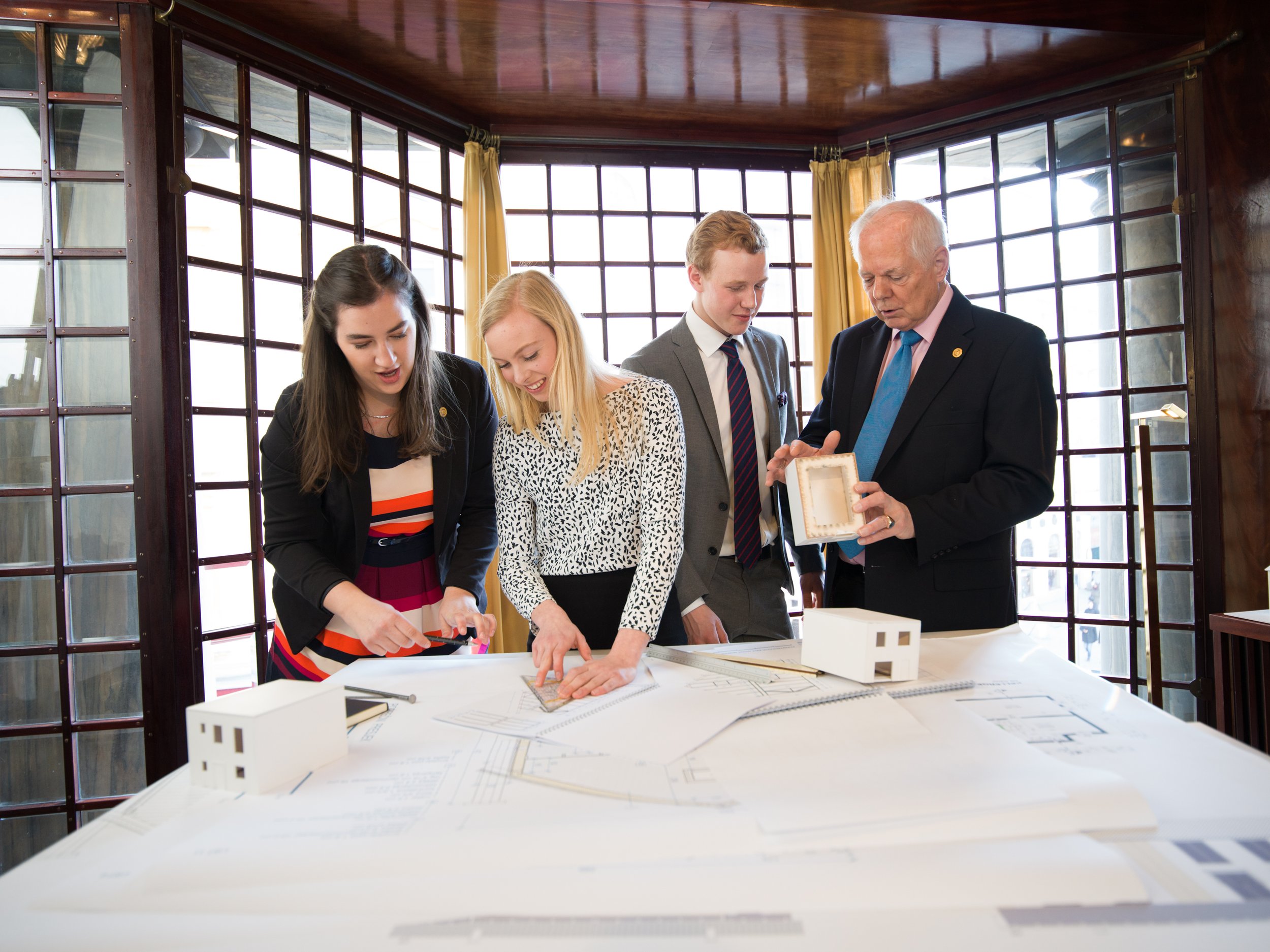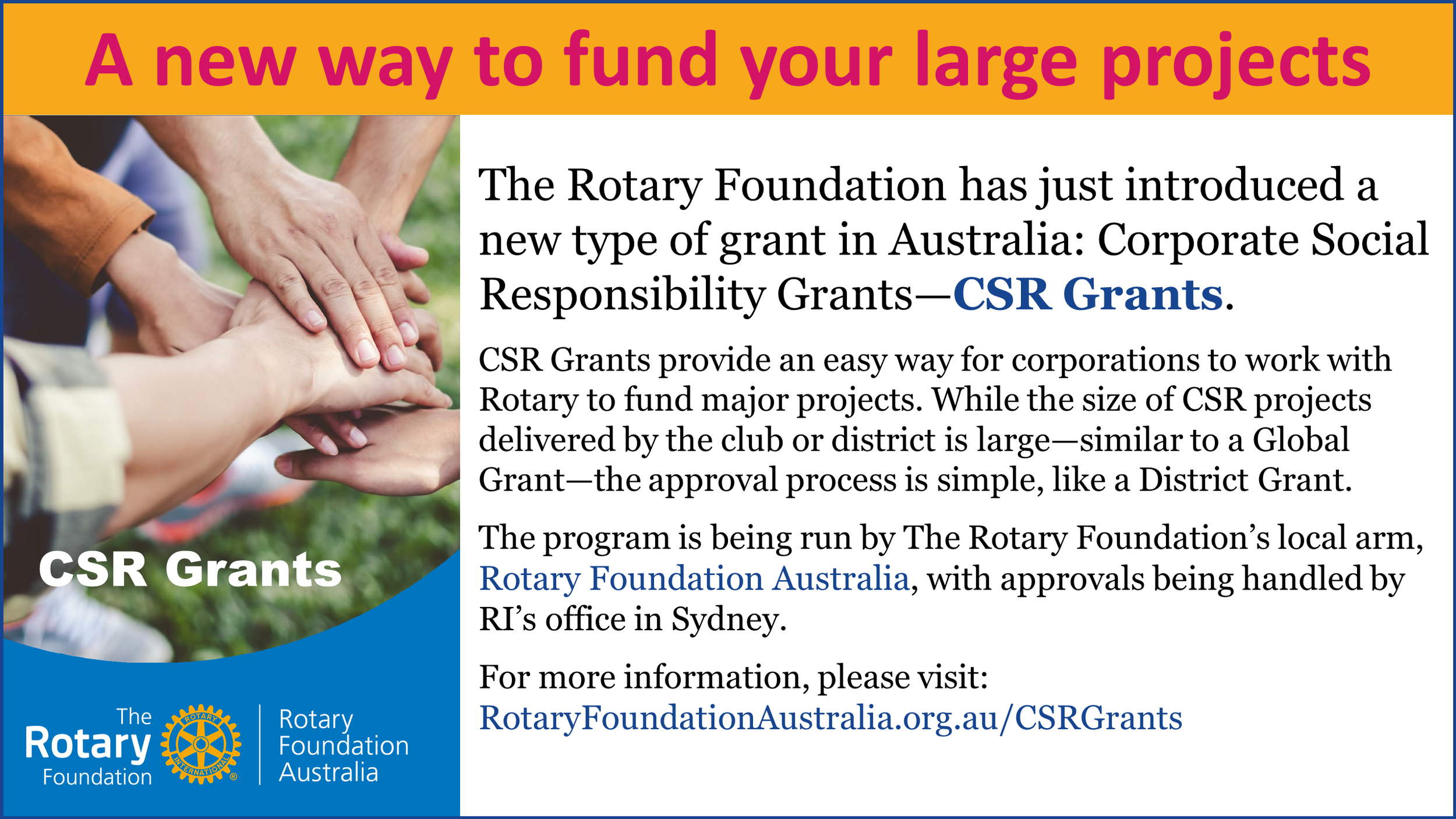
CSR Grants
CSR Grants
In April 2023, the Trustees of The Rotary Foundation approved a new kind of grant for deployment in Australia and Brazil—Corporate Social Responsibility Grants, or CSR Grants.
CSR Grants provide a straightforward way for corporations to engage with Rotary in the delivery of mutually agreed outcomes.
For example, if a corporation has a focus on making a difference in the education of children in indigenous communities, chances are there’s a Rotary club that will have very similar aspirations—along with the ‘feet on the ground’ to bring the project to life.
In other cases, an Australian Rotary club may, as an example, be looking for funding for a project that will deliver outstanding outcomes in the growth of small businesses in a country where the corporation is doing business. Rotary’s network of over 35,000 clubs, in almost every country in the world, can help make this possible.
Rotary clubs and districts in Australia are encouraged to utilise CSR Grants to:
deliver much greater impact
expand their reputation for delivering amazing outcomes
build stronger connections with the business community.
Each of these outcomes helps Rotary clubs and districts to grow and prosper while truly ‘making a difference in the world’.
Clubs and districts are welcome to use this image in their newsletters and other materials to let members and others know about CSR Grants. Click here to download.
Some key points about CSR Grants:
the donor must be a for-profit corporation
approvals are handled within Australia by Grants Officer Kym Schwarz in RI’s Sydney office (02 8894 9810)
the minimum contribution from the corporation is US$21,000—about A$35,000
there’s no maximum contribution but Cadre and Trustee approvals are required for grants in excess of US$100K and US$400K respectively
there are far fewer restrictions than for Global Grants—for example, construction of buildings is permitted and compliance with an Area of Focus policy statement is encouraged rather than mandatory
an entire project can be funded by the corporation:
however, this can be supplemented by cash contributions from individuals, clubs and districts
while District Designated Funds can’t be applied to a CSR Grant, and there’s no World Fund match, districts can allocate a portion of their District Grant to a CSR Grant project
if the situation would benefit from inclusion of DDF funding from local and international districts, along with a World Fund match, it’s still possible for corporations to make their contribution in the form of a Directed Gift to a Global Grant, rather than a CSR Grant
CSR projects can be local or international but our observation is that most corporates prefer to support activities ‘in their own back yard’, so international projects are less common
CSR Grants attract an administration fee of 5% (but this reduces to 4% for grants over US$75,000 and 3% for grants over US$150,000).
For details of the CSR Grants program, please see our CSR Terms and Conditions.
For a detailed comparison of all Grants programs, please access the Grants Comparison Guide.
To share your idea for a CSR Grant, please complete and submit the CSR Expression Of Interest Form.
To apply for approval of a CSR Grant, please complete the CSR Grant Application form.
To establish a partnership with the cooperating organization(s), please download and complete the Memorandum of Understanding template.
To establish a partnership between The Rotary Foundation Australia and the corporate donor, please download and complete the CSR Memorandum of Understanding template.
Connecting with Corporate Donors
A key question for a club to consider when seeking funding from a corporate donor is: what’s in it for the corporate.
Most corporates wish to earn the esteem of customers and other stakeholders—they will be most interested in supporting high-impact activities in the places where they do business. As a result, support for local projects tends to be stronger than for overseas projects—but, of course, many Australian corporates do business all over the world.
Another key factor is the type of activity that interests the corporate. Some are focused on indigenous issues, others environmental matters and so on—Rotary’s extraordinary range of activities addresses most potential areas. If your project focuses on, say, youth and education, look for corporates who are passionate about making a difference in the lives of kids.
A good place to look for this information is in the corporate’s website. However, it’s also a good idea to open a dialogue with Rotary members in the places where the project will be undertaken—they will often have valuable insights into organisations that do business in their communities.
Consider whether the corporate is interested in simply contributing to a great cause or supporting a specific high-impact project:
for general donations, Rotary has a wide range of outstanding funds, such as PolioPlus and our seven Areas of Focus, each with very low administrative overheads and extraordinary recognition from ratings organisations
Rotary is able to work hand-in-hand with a corporate to:
• deliver outstanding projects
• addressing issues about which the corporate is passionate
• with mutually agreed tangible outcomes
• virtually anywhere in the world.
This is a combination that’s very hard to find elsewhere.
A key differentiator for Rotary is that we are a very large network of people doing good in the world. One of the key linkages in our network is our districts—involving your district team can be extremely valuable in leveraging our global network.
When it comes time to convey the value that Rotary can deliver to prospective corporate donors, the staff at The Rotary Foundation, as well as the team of volunteers at Rotary Foundation Australia, can:
research Rotary’s connections with the corporate
advise on the best way to structure the funding (eg. CSR Grants or Global Grants) and
participate in discussions.



